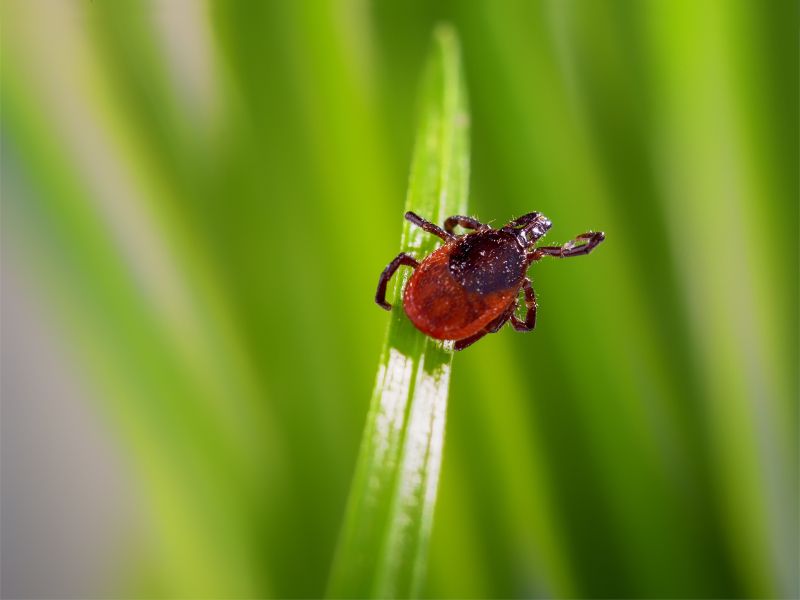Is Allergy Season Affecting My Dog?

If you’ve noticed your dog scratching a lot more lately, you are not alone. The team at All Creatures Veterinary Hospital gets plenty of questions about this behavior as the weather begins to warm. Seasonal allergies in canines are a frequent cause of skin disorders and other complications this time of year. Keep reading for more information on how seasonal allergies affect your pet and which dog allergy treatment can take the itch out of spring.
Continue…All About Lyme Disease in Dogs

The arrival of spring brings with it plenty to be excited about – abundant sunshine, leaves on the trees, and relief from the endless winter, just to name a few.
Among the downsides of spring are the arrival of ticks, and here in the Northeast we have more than our fair share of these creepy crawlies to content with. Those of us with dogs know all too well how easy it is for our canine companions to pick up a hitchhiker or two after a walk or romp in the park.
It’s no secret that ticks can transmit a variety of diseases to people and pets, and Lyme disease is one of the most common, and most concerning. Preventing Lyme disease in dogs is critical to their long term health and well being, and fortunately it’s relatively simple!
Continue…Heartworm Disease in Urban Areas: Is it Really a Risk?

Looking at a map of heartworm disease in the U.S., it’s easy to see what a threat this condition poses to our pets. Over the last two decades, the incidence of heartworm disease has jumped an average of 6-25 cases per clinic per year in the New York area. Considering how many animal hospitals there are in our region, these statistics are anything but promising.
The best defense against heartworm disease is the timely administration of preventive medication. Without this, the number of cases each year will continue to grow, leaving our best friends exposed to a range of health problems – including death.
Mosquitoes in Brooklyn
Mosquitoes are an ever-present threat to the health of people and pets in Brooklyn and beyond. Just last summer, the New York City Department of Health sprayed more than a dozen Brooklyn neighborhoods with pesticide in an attempt to control the spread of West Nile Virus. Mosquito traps and water pools tested positive for the disease in 17 Brooklyn zip codes.
Vector-Borne
Mosquitoes transfer heartworm disease from animal to animal. Once an infected mosquito deposits the microscopic worms into the bloodstream of a host, it can take about 3 months for the larvae to develop. Without a heartworm preventive to kill off the worms, larvae will grow inside the blood vessels surrounding the heart and lungs, severely compromising the health of a pet.
Why We Test
We test for heartworm disease during annual exams. Without a negative result, it’s highly dangerous for a pet to start heartworm medication.
Even pets who spend all their time inside should be routinely tested and given a monthly dose year-round. Remember, mosquitoes are extremely pesky and can work themselves inside any apartment or house, exposing pets to the disease.
A Positive Result
Many pets won’t display any symptoms of heartworm disease. Once the worms have matured, however, some dogs may develop a cough or have trouble breathing. It’s also common for pets to lose interest in food and to appear weak or lethargic. A previously excitable pet will become tired after minimal exertion.
Cats may vomit, experience severe coughing spells, and display respiratory distress. Some cats may also die suddenly from heartworm disease.
Treatment vs. Prevention
Heartworm-positive dogs can undergo treatment for heartworm disease, but it’s both expensive and risky. Hospitalization, medications, anti-inflammatories, and cage rest for at least a month are all common treatment protocols. Surgery may even be required to remove heartworms from the heart and lungs.
Unfortunately, cats cannot be treated for heartworm disease.
Preventing heartworm disease is easy. Simply remember to give your pet their monthly dose throughout the whole year. We recommend setting up alerts on your phone or placing stickers on your calendar as a reminder.
Heartworm Disease in the City
Mosquitoes are most active at dawn and dusk. While these times are great for walking your dog in the middle of the summer, be mindful of mosquitoes. Likewise, clean up any standing water on your property and ensure that all windows and door screens are free of holes. Stay up-to-date on your pet’s flea and tick medications, as these can also repel mosquitoes.
Please contact us with any questions or concerns. The team at All Creatures Veterinary Hospital of Brooklyn is always here for you and your pet.
Pesky Parasites: The Importance of Flea and Tick Prevention

Spring fever? Not yet, but it will be here before your know it! Soon you will start seeing flowers in planters, a warm breeze from time to time and definitely more bikes on the road.
Our pets feel this change in the air just as much as we do, and they are usually ready to get outside and enjoy some spring breezes and sunshine, too. But a little extra time outside can also remind us that parasites that live on our pets are ready for warm weather, too.
As we enter peak season for bugs, it’s time to focus on flea and tick prevention so that we can guard against potentially life threatening diseases, health concerns, and major discomfort for your pets and for you! All Creatures Veterinary Hospital of Brooklyn shows you the way.
Continue…Our Favorite Pet Friendly Spots in Crown Heights and Prospect Heights
 Anyone who’s familiar with Brooklyn knows the unique combination of energy and eclectic charm that characterizes our little corner of the world. Coffee shops, restaurants, bars, parks, and the general sense of community keep residents and guests happy, no matter the weather or time of year.
Anyone who’s familiar with Brooklyn knows the unique combination of energy and eclectic charm that characterizes our little corner of the world. Coffee shops, restaurants, bars, parks, and the general sense of community keep residents and guests happy, no matter the weather or time of year.
Pets can also reap the benefits of our cozy borough. In fact, the number of pet friendly spots to eat and play continues to grow; let the team at All Creatures Veterinary Hospital of Brooklyn share some of our favorites! Continue…
Hot Dog! Keeping Your Pet Safe During Warm Weather
 It’s important to consider pet safety year-round, but especially when the temps start to rise. Keeping your pet safe is a must for outdoor enjoyment, and the team at All Creatures Veterinary Hospital is here with some simple suggestions!
It’s important to consider pet safety year-round, but especially when the temps start to rise. Keeping your pet safe is a must for outdoor enjoyment, and the team at All Creatures Veterinary Hospital is here with some simple suggestions!
Heat Stroke Awareness
Heat stroke is a condition that occurs when the body overheats. Because pets don’t sweat like humans, they must rely on limited mechanisms, like panting. Each year, hundreds of pets succumb to heat stroke because they were left outside or in a confined space (like a car). It’s absolutely crucial to protect your pet by never leaving them in a parked car or chained up outdoors.

